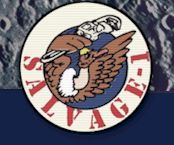TV Guide
Review
The following is a review of the series Salvage 1 which appeared in TV
Guide in March, 1979.
Special thanks to Paul-Dean Martin for sending
this!

|
Once you have been to the moon, some astronauts say, everything
afterward is a letdown. That should have provided a clue to the makers
of this ABC adventure series. The two-hour pilot was a farfetched
simple-headed but enjoyable tale of a scrap tycoon (Andy Griffith) who
builds his own rocket to salvage abandoned space machinery from moon
landing sites.
The end of that story would have been a judicious moment to close down
the shop and take up a new line of work. But television is always
hungry, so Salvage-I has been spun out for a weekly run. Now Griffith
and his pals use the rocket to hop around the Earth-a strangely
cost-inefficient form of travel-to salvage items from remote places. In
the pilot show, Griffith recruited his supporting cast: Joel Higgins as
an unemployed astronaut, Trish Stewart as a demolitions expert capable
of making rocket fuel and of looking good in jeans. Scrounging old NASA
parts, they built a moon vehicle. (If all this space gear could be
bought so cheaply, what was the point of salvaging parts on the moon?
Oh, well.) While an officious FBI man (Richard Jaeckel) made sputtering
attempts to stop the takeoff, Higgins and Stewart blasted off in their
home made rocket and in due course reached the moon.
The story had its charms. The idea of everyday citizens flying to the
moon has folk-appeal, the rocket-building process was picturesque if
preposterous, the musical score was good, and the amateur rocketeers
were a cocky and likable bunch-including Griffith, still getting away
with his ol'-country-boy number.
Now, however, it's the writers who are scrounging. In one story, the
team landed on a jungle island to capture rare monkey specimens. There
they found a dithery scientist and an abominable ape-man of some sort.
The ape-man attacked, the rocket was damaged and wouldn't take
off...you get the picture. I thought the island looked a lot like
Laurel Canyon.
In another story, our heroes set down in Burma to salvage a World War
II bomber for an aviation museum. Guarding the airplane was the
ever-popular Japanese soldier who doesn't know the war is over. The
soldier got the drop on the salvage group, but then helped them fight a
troop of Chinese guerrillas. In the end they flew him home, gently
breaking the news about who won the war. Simple entertainment is the
idea, but someone on Salvage-I is putting too much stress on the
"simple."
When two-hour TV-movies first appeared, they seemed to offer a chance
for television to break the monotony of week-to-week series. Now,
virtually every two-hour feature is a "pilot" for a series, laying the
groundwork for monotony to come. A good TV-movie, by and large, is one
that ends. It's a shame when a good sprinter, is passed off as a
distance runner.
As those astronauts said, once you've gone to the moon, there's no
place to go but down. 
TV Guide MARCH 24, 1979 |
|



